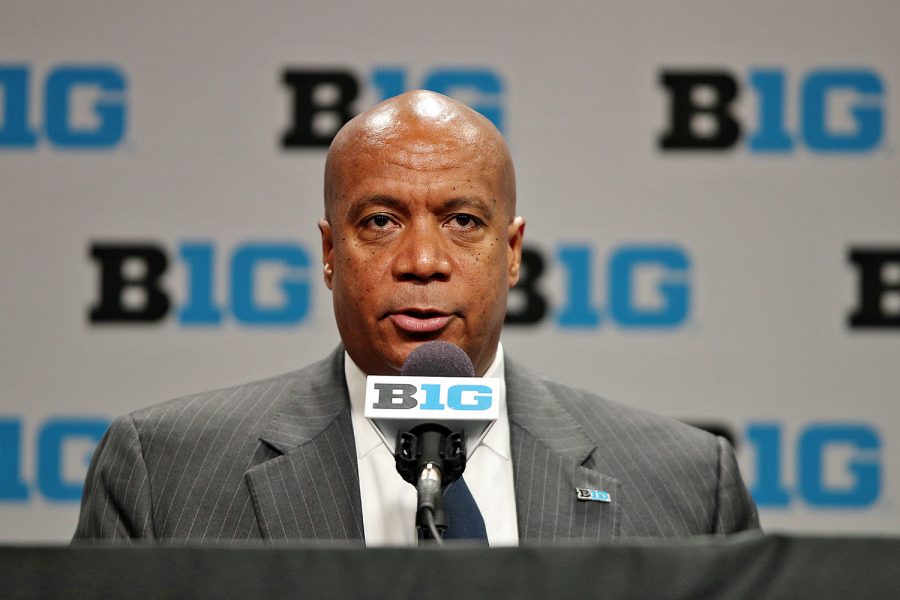Big Ten Commissioner Kevin Warren sends letter to conference’s ADs addressing fall sports, training camps
Iowa and other Big Ten football teams are scheduled to start fall training camp Aug. 7.
Big Ten Conference Commissioner Kevin Warren addresses reporters regarding the cancellation of the 2020 Big Ten men's basketball tournament at Bankers Life Fieldhouse in Indianapolis, on Thursday, March 12, 2020.
July 31, 2020
According to a letter that was reportedly sent to Big Ten athletic directors Thursday by Commissioner Kevin Warren and Dr. Chris Kratochvil, the chair of the conference’s Task Force for Emerging Infectious Diseases, medical policies and COVID-19 testing procedures for the conference will be released next week.
However, the start of Big Ten football fall training camps could still be delayed and 2020 fall seasons are still not a certainty for the conference.
“The health and safety of our students, student-athletes, and everyone associated with our Big Ten university communities has been and will remain our primary focus,” the letter stated. “We remain hopeful to compete this fall in men’s and women’s cross country, field hockey, football, men’s and women’s soccer, and women’s volleyball, understanding that we must operate in a manner that seeks to address the challenges that COVID-19 presents.
“If we determine as a Conference that it is not prudent to compete in the fall of 2020, we will not do so, much like our decision in March 2020 to cancel the Men’s Basketball Tournament in Indianapolis. Our final decision will be rooted in guidance from medical experts and in consultation with institutional leadership, student-athletes, coaches and appropriate federal, state, and local authorities.”
The contents of the letter were first reported by Dan Hope of Eleven Warriors on Thursday night.
The Iowa football team, as well as several other teams from around the conference, are currently scheduled to start fall camp on Aug. 7. That has been the start date since the NCAA established its timeline for summer workout and practice dates in June.
According to the letter, that date could be pushed back for Big Ten teams and an official announcement on fall camps is expected to come in the next five days.
“We will not, and cannot, proceed with preseason camp until we are certain that we can do so safely and that will depend, in part, on testing,” the letter stated. “Once we have everything in place to execute our testing protocols effectively, including the appropriate number of tests secured for all fall sports, we can make a decision as to whether preseason camp will begin as currently scheduled.”
The Big Ten announced July 9 that it will be playing conference-only schedules if fall sports are played this fall amid the COVID-19 pandemic.
By limiting competition to only other Big Ten schools, the conference said in a statement that it will have the “greatest flexibility to adjust its own operations throughout the season and make quick decisions in real-time based on the most current evolving medical advice and the fluid nature of the pandemic.”
Thursday’s letter states that many options are still under consideration within each sport and that the conference expects to release updated schedules in August.
“While we remain hopeful for a start in September 2020, flexibility has been created within our scheduling models to accommodate necessary adjustments,” the letter stated. “Consistent with our collective need to be adaptable to changes in circumstances and evolving medical knowledge, even issuing a schedule does not guarantee that competition will occur.”
In the athletic department’s latest COVID-19 testing update on Monday, Iowa announced that it conducted 20 COVID-19 tests for the week of July 20-26 and received one positive test and 19 negative tests. Iowa’s testing began May 29 and includes student-athletes, coaches, and staff. A total of 27 positive tests and 506 negative tests have been received.
On Tuesday, the Iowa men’s basketball team announced that it was pausing voluntary workouts for 14 days after two student-athletes tested positive for COVID-19 on Monday.
The Big Ten’s safety protocols are being finalized by the conference’s Task Force for Emerging Infectious Diseases.
“Policies and protocols will include medical standardized testing requirements that will be consistently evaluated to ensure we are accounting for current medical recommendations.” the letter stated. “We believe that the implementation of these protocols will help us mitigate risk as we seek to safely resume athletic activity and competition.”



